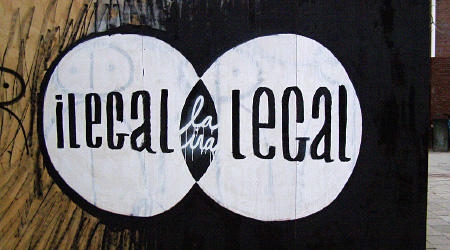Ways For A Small Business To Get In Legal Trouble

There are numerous ways for small businesses to get in legal trouble some of which are common sense and others which are specific to commercial organizations. The key to running a business is similar to life in that if it makes you uncomfortable or you second-guess whether or not you should be doing it then you probably shouldn't. The following is a list of some common illegal or unethical business practices which should be avoided by reputable businesses.
Committing Tax Fraud
Any issues having to do with paying or withholding taxes are bound to be scrutinized by both the state and federal government. Sales tax is the most obvious type of fraud as many cash only businesses only track a percentage of their sales instead of declaring all sales and making the appropriate tax payment. Sales tax is often paid monthly or quarterly and if not paid on time will normally incur late fees or penalties. If you operate a small business and try to stay completely off the radar and fail to pay any taxes you will most likely be charged with tax evasion.
Another common tax problem arises when trying to declare non-business expenses or exaggerating expenses to lower taxable income. The federal government will undoubtedly audit small businesses more often than individuals and will require proof of deductions for business expenses. If you go into an audit without proper paperwork such as CPA certified income statements or verifiable receipts the outcome is not likely to be good.
Selling Stolen Goods
Theft falls under the common sense category of if you plan on running a reputable business don't plan on selling stolen merchandise. Any customer who walks into a store where prices are too good to be true, especially if they're below cost, is bound to raise some red flags and lead to possible police involvement. This type of business may be able to avoid detection in the short term but they most always get caught due to greed and stupidity.
Defrauding Consumers
Fraud is a more common occurrence in many businesses because it is easy to claim ignorance or that it was an accident but if a pattern is established then it will most certainly be prosecuted. Fraud includes such issues as bait and switch tactics like advertising one product but then selling something else or lying to customers about warranty coverage which doesn't exist or is exaggerated. Even more shady fraudulent activity can be perpetrated by "accidentally" charging more for more product than what was purchased by the customer or by failing to transfer paid for items from one cart to the bag or another cart when the customer leaves the store.
Under the Table Employees
Often labor expense can be one of the most expensive aspects of running a business and as such it is sometimes tempting to pay employees off the books. Businesses who consider this option do so mainly to avoid additional costs like making workers compensation payments to the state or paying federal taxes on employee wages. Some small businesses will also use under the table payments for employees which are not legally able to work in the United States. Not only does this deprive the state and federal governments of employee benefits and taxes but also results in abusive and below industry standard wages due to fear. Illegal employees often have no legal recourse and are threatened with deportation and therefore did not complain about making two or three dollars an hour.
Discrimination and Sexual Harassment
It is common knowledge that employment discrimination on any level is unacceptable and strictly prohibited by law in the United States. However, even with laws on the books and multiple court cases, businesses still feel compelled to discriminate although now it is more subversive and less out in the open. It is patently illegal to discriminate based on gender, race, religion or age.
Abuses don't stop during the interview process either and are often carried to the work floor for unsuspecting employees. Sexual harassment and a hostile work environment are another common sense situation that businesses should take all means to avoid. Again, much like discrimination, sexual harassment and subsequent retaliation are often subversive and implemented with subtle suggestion and innuendo or not promoting unreceptive employees.
Pricing Fixing and Collusion
Illegal pricing is one of the biggest ways for a small business to get legal trouble. Price-fixing, also known as collusion, is where multiple merchants all agree to charge the same inflated price for a product or service. This is exactly the opposite of a competitive marketplace where pricing pressures are supposed to drive down prices and increase quality. This was a common practice and was subsequently made illegal by Congress under the Sherman Antitrust Act.
Price discrimination is another illegal practice which is usually perpetrated against minorities and other disenfranchised individuals whom a business owner dislikes or is targeting. An example would be landlord who charges more for minority tenants that they do for white tenants. This of course is completely illegal as well as unethical and immoral and is bound to raise federal and state investigations.
Summary
As stated in the beginning, there are many ways for small businesses to get in legal trouble and the easiest way to stay out of trouble is to be honest and fair with all customers and employees. Many business owners are normally law-abiding citizens who make the right decision with respect to how they conduct their business. What happens however is a situation presents itself which may be considered a gray area and often leads to poor judgment and serious legal consequences. As a business owner, if you do the right thing and treat people the way you want to be treated then you should be able avoid any sort of legal trouble.







